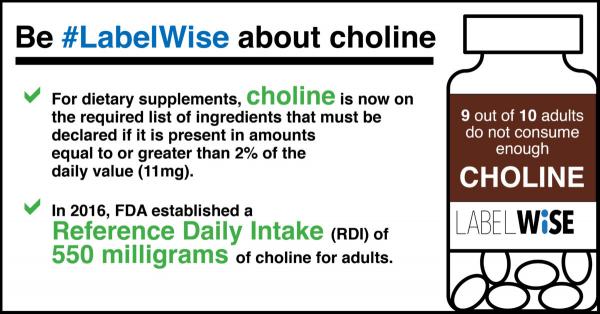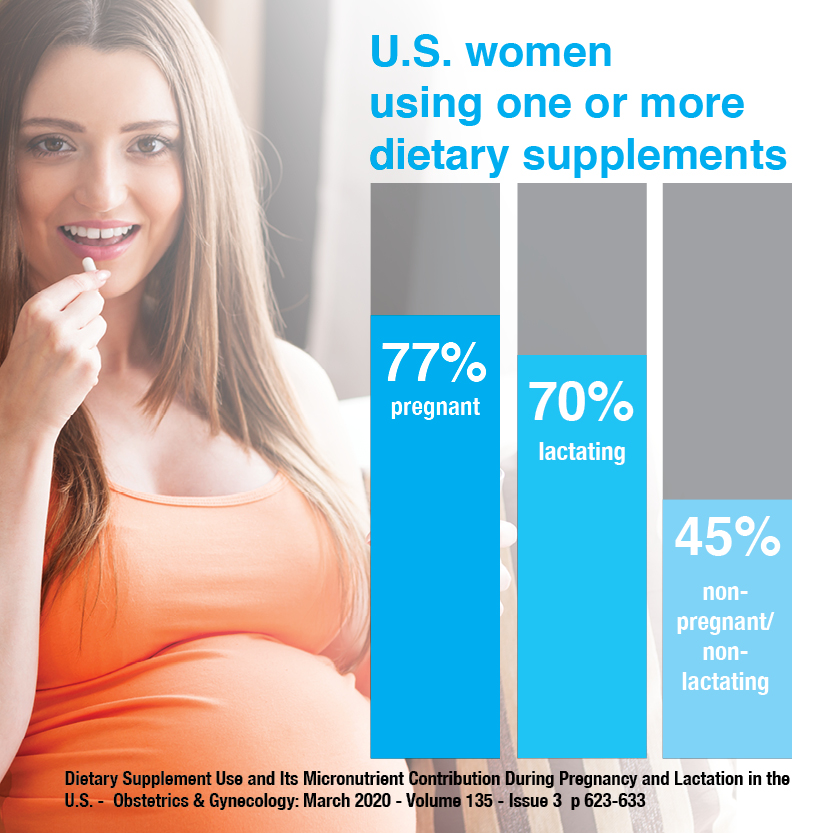FEBRUARY 27, 2020
CRN's #TeamScience member Haiuyen Nguyen attended “Nutrition during pregnancy and lactation: Exploring New Evidence – A workshop” convened by the National Academies of Sciences, Engineering, and Medicine last month in Washington, DC. The workshop presented key science that could have policy implications as the 2020 Dietary Guidelines for Americans Advisory Committee (DGAC) evaluates evidence to support its recommendations. The DGAC review process is taking a "life-stage" approach and will, for the first time, include pregnant women and children from birth to 24 months. The Dietary Guidelines for Americans are updated every five years and serve as the cornerstone of federal nutrition programs and policies. Two specific nutrients with short- and long-term health implications for mother and child that experts discussed at the workshop are choline and iodine.
Choline, essential nutrient for maternal and child health
Help spread the word about the importance of choline with CRN's #LabelWise shareable graphic.
 According to Cornell University professor and workshop presenter, Marie Caudill, Ph.D., R.D, choline is required for fetal growth and neurodevelopment, and higher maternal choline intake has been associated with lower risk of neural tube defects and pre-eclampsia. Dr. Caudill’s own recent research showed that higher maternal choline intake (930 mg/d) was associated with improved infant cognitive function compared to lower choline intake (480 mg/d). Both the American Medical Association and the American Academy of Pediatrics currently recognizes choline as a key nutrient for fetal and infant development. While the body’s demand for choline is very high during pregnancy, only 8% of pregnant women meet the recommended intake of 450 mg/d. Therefore, most pregnant and lactating women need to consume more choline in the diet or take a choline supplement to meet recommendations.
According to Cornell University professor and workshop presenter, Marie Caudill, Ph.D., R.D, choline is required for fetal growth and neurodevelopment, and higher maternal choline intake has been associated with lower risk of neural tube defects and pre-eclampsia. Dr. Caudill’s own recent research showed that higher maternal choline intake (930 mg/d) was associated with improved infant cognitive function compared to lower choline intake (480 mg/d). Both the American Medical Association and the American Academy of Pediatrics currently recognizes choline as a key nutrient for fetal and infant development. While the body’s demand for choline is very high during pregnancy, only 8% of pregnant women meet the recommended intake of 450 mg/d. Therefore, most pregnant and lactating women need to consume more choline in the diet or take a choline supplement to meet recommendations.
Iodine for normal neurodevelopment during pregnancy and early childhood
To accommodate the increased need for iodine during pregnancy and lactation, the Institute of Medicine’s recommended intake is 220 mcg/d for pregnant women and 290 mcg/d for lactating women. Data show that iodine intake from the diet is low even with table salt iodization in the U.S. As much as 77% of salt in the American diet comes from restaurants meals and processed food, which are not usually iodized. Although there is limited data on the iodine status of U.S. pregnant women, there appears to be mild-to-moderate iodine insufficiency in this population; therefore, the American Academy of Pediatrics and American Thyroid Association recommend that pregnant and lactating women use supplements containing 150 mcg iodine daily. According to Elizabeth Pearce, M.D., professor of medicine at Boston University School of Medicine, data show that only about 18% of pregnant women and 19% of lactating women report using a dietary supplement with iodine.
CRN has developed voluntary guidelines for iodine quantity in multivitamin/mineral supplements for pregnancy and lactation and published a paper titled “Iodine Supplementation During Pregnancy and Lactation” in Natural Medicine Journal.
Updates in science may impact dietary recommendations for women who are pregnant or lactating
The Academies last reviewed the science in this area 30 years ago and released two reports and recommendations: Nutrition During Pregnancy (1990) and Nutrition During Lactation (1991). Since the 1990s, there has been advances in the understanding of nutritional requirements during pregnancy and lactation, as well as changes in dietary patterns, nutritional supplement use, and prevalence of obesity and diabetes in the U.S. population. These changes may impact dietary recommendations for women who are pregnant or lactating. Sponsored by the Office of Dietary Supplements of the National Institutes of Health, Health Canada, and the Academy of Nutrition and Dietetics, the workshop invited over 20 experts to discuss current science on nutrients, nutritional supplements and other nutrition-related topics relevant to pregnancy and lactation. The proceedings of the workshop will be published in Summer 2020.
Supplement use widespread, but shortfalls remain
 Regan Bailey, Ph.D., M.P.H., R.D., C.P.H., of Purdue University's Department of Nutrition—and 2020 DGAC member—spoke at the National Academies' workshop and shared data from from her newly published study, "Dietary supplement Use and Its Micronutrient Contribution During Pregnancy and Lactation in the United States," indicating that 77% of pregnant women and 70% of lactating women use dietary supplements compared with 45% of non-pregnant, non-lactating women. Dietary supplements help consumers meet the recommended targets, but may contribute to excessive intake for certain nutrients, Dr. Bailey observed. However, she noted, even with dietary supplement use, pregnant women do not consume enough key nutrients—specifically iron, potassium, calcium, magnesium, zinc, and vitamins A, C, D, E, K, B6, folate and choline.
Regan Bailey, Ph.D., M.P.H., R.D., C.P.H., of Purdue University's Department of Nutrition—and 2020 DGAC member—spoke at the National Academies' workshop and shared data from from her newly published study, "Dietary supplement Use and Its Micronutrient Contribution During Pregnancy and Lactation in the United States," indicating that 77% of pregnant women and 70% of lactating women use dietary supplements compared with 45% of non-pregnant, non-lactating women. Dietary supplements help consumers meet the recommended targets, but may contribute to excessive intake for certain nutrients, Dr. Bailey observed. However, she noted, even with dietary supplement use, pregnant women do not consume enough key nutrients—specifically iron, potassium, calcium, magnesium, zinc, and vitamins A, C, D, E, K, B6, folate and choline.
Encourage use of the conversion calculator on CRN's BeLabelWise.org microsite to calculate intakes of key nutrients such as vitamin A and E that are changing from IU to more common metric units.
Looking ahead to the updated Dietary Guidelines for Americans
In parallel, the 2020 DGAC is for the first time developing dietary recommendations for pregnant and lactating women and evaluating the relevance of specific nutrients from dietary supplements and health outcomes in this population as part of its process to develop the 2020–2025 Dietary Guidelines for Americans. CRN has been monitoring and participating in the process, with Haiuyen providing a brief presentation summarizing CRN's comments at the DGAC's second round of public meetings back in July of 2019. Haiuyen will also attend the March 12–13 fifth and final DGAC meeting taking place before it issues its report in May 2020. CRN will provide additional comments as the dietary guidelines process moves forward.
The public can still provide written comments—learn more via the Dietary Guidelines for Americans website.
Questions?
Please contact Haiuyen Nguyen (hnguyen@crnusa.org).

